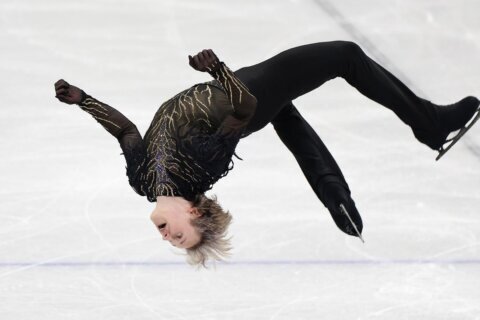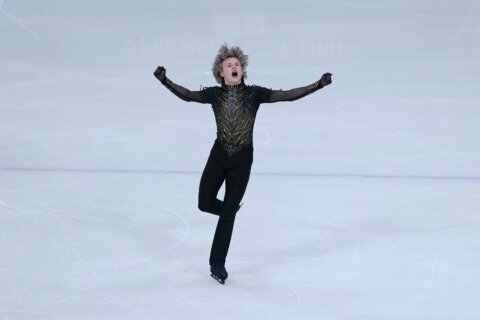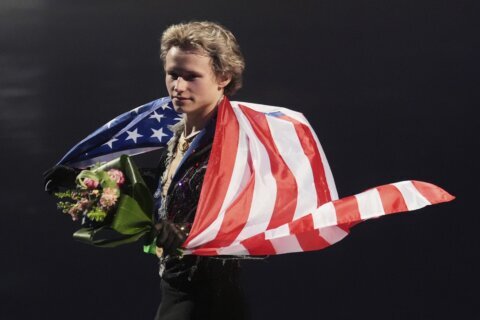WASHINGTON — It’s a funny thing, watching Olympic coverage from a non-American broadcast affiliate. Gone is the homerism, the constant pushing of the nationalistic narrative, with a more objective tilt taken to the entire affair.
This is even funnier when watching an American win an event, or one that perhaps wasn’t expected to, like Beltsville, Maryland, native Matthew Centrowitz in the men’s 1,500 meters in Rio.
Right from the start, the commentators set the stage for anyone but Centrowitz, declaring that “already, they’re playing into the hands of the sprint finishers,” despite the American gaining the inside rail and dictating the pace. They were almost laughing at the sluggish start — a 66-second opening lap — emphasizing those lurking in the wait.
But as the swell picked up, Centrowitz maintained his position, muscling back into the lead along the backstretch leading into the bell lap. Not until just over 300 meters to go was the possibility of his win even acknowledged in the broadcast.
In the final 120 meters, the announcers were searching for any name that might catch him, not believing he would win until he actually crossed the line, and even then maybe not.
But to hear Centrowitz talk about the race months later, on the 13th floor of the National Press Building in downtown Washington, it was all part of the plan.
“I like front running in championship races because they tend to be tactical,” he explained. “Anytime there’s a move that’s made, it’s easier to cover it, because you’re in front. You can kind of see what’s going on.”
The slow start may have stunned the field and the broadcast team, but it was nothing new for Centrowitz. Not only were the competitors running their third heat in as many days, but as the first event for the television schedule, he revealed they were held longer than usual in the paddock to line up timing for the broadcast. That meant anxiety and nerves creeping in as legs tightened up.
“I looked around, and you could see at least two or three of the guys in the field were going up to officials, tapping their watches,” Centrowitz said, explaining that he drew on others’ tensions to keep himself calm. “They’re over there freaking out, you could see their heads racing, their minds racing, trying to run out of the area. I knew it was going to be tactical right from the get-go because of that, and I just used it as a positive.”
Centrowitz had won a slow 1,500-meter title with bigger names in the field before. The crawling start at the beginning of the 2009 Pac-10 title race gave way to a blistering finish, where he held off Oregon teammate Galen Rupp and the rest of the field at the line. That experience allowed him to be comfortable out front, not worried about the achingly slow opening laps or the final time.
“When you’re going that slow, what difference does it make when you’re cutting the wind going 2:13, or running in the back going 2:14?” he said, noting how much more the time matters when everyone is running at full effort down the stretch. “Those tenths makes a huge difference. We’re all closing within tenths of each other, but at that point, it’s about who’s in the front and what position you have.”
The strategy paid off. After a fourth-place finish in London, the Olympic nightmare lived out by another American distance legend, Steve Prefontaine, Centrowitz found the redemption Prefontaine never did four years later.
But after all the celebration, including events like the one at the National Press Club and another at Broadneck High School upon his return home, what comes next for the 27-year-old? We tend to think of Olympians only in their once-every-four-year cycle — Tokyo isn’t until 2020.
“It’s four years away,” said Centrowitz. “I’ve always [taken] more of a short-term approach.”
That means focusing on next year’s World Championships, and beginning to mix in more 5K races as he inches toward 30. Older runners tend to race better at longer distances, so Centrowitz’s 2020 outlook may be different than it was this summer. But trying to defend his 1,500 title is certainly a goal.
The Olympic 1,500 has been a great equalizer among international runners. It’s been won by Europeans, Australians and Africans. But before Centrowitz, it had not been won by an American runner since Mel Sheppard in 1908, a drought which ran concurrent to that of the Chicago Cubs. Only one man has defended his Olympic 1,500 title, Englishman Sebastian Coe in 1984. Outside of his repeat, the country claiming gold has changed every year since 1932.
That history isn’t deterring Centrowitz.
“I’m excited to toe the line and hear my name announced as the previous champion,” he said.
Until then, he’ll put in 105-mile weeks, with weekly distance runs of 15–18 miles, as long as many marathon trainers’ longest pre-race workouts. He’ll keep running intervals workouts at paces most humans could only dream of racing at. And he’ll revel in the afterglow of his win until it’s time to get ready for the next race.
“I’m just enjoying the whole journey, this moment, this whole experience, and really just taking it in,” he said. “Although my gold lasts forever, this moment doesn’t. I’m really just soaking it all in.”







